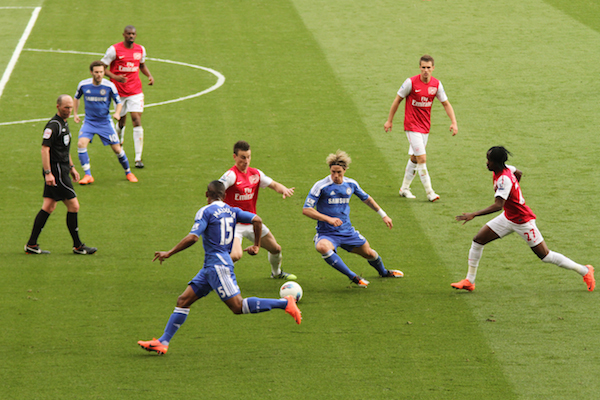Dear Sports Fan,
Ok, so I downloaded the app FotMob and being a newbie to soccer (thanks to Fancred), I have a few questions. What are all the different leagues in the U.S.? I thought I would start out following those and the World Cup stuff when it comes around. Just trying to figure out what all is going on. Would take any suggestions on who else to follow. What leagues and people should I follow as a new soccer fan?
Thanks,
Tim Lollar
Dear Tim,
Congratulations on getting into soccer! Learning any new sport can be a fun and intellectually stimulating experience. As you learn the new sport, it subtly changes the way you think about sports you already understand well and even other aspects of your life. You may even find yourself having eureka moments about something at work or with a relationship and be able to trace it back to something you thought of while learning soccer. Long story short, learning about anything sparks learning about everything. If you haven’t already explored them, we offer a few easy email courses on soccer: Soccer 101, Soccer 201: Positions and Logistics, and Soccer 202: Culture.
It’s a particularly interesting time to become a new soccer fan. Thanks to this year’s women’s World Cup and last year’s men’s World Cup, both of which were conveniently located for U.S. soccer fans, there’s a tremendous amount of excitement about soccer. Unfortunately, it will be another three years until the next men’s World Cup and four until the next women’s. That’s a shame because, especially for the non-totally-hard-core soccer fan, the World Cup is the ultimate competition. Luckily, the alternatives are plentiful and exciting in their own right:
- In the United States, the two main professional leagues to follow are Major League Soccer (MLS) for men and the National Women’s Soccer League (NWSL) for women. Both leagues are in the middle of their seasons, so now is a good time to become a fan. Choose the team closest to you and start rooting. One of the great things about professional soccer in the United States is that tickets are still quite accessible, even for normal people. NWSL tickets can be had at most stadiums for between $15 and $40 and MLS tickets go from $25 to $100. I wrote an entire post about how to follow the NWSL because, although all its games are available on YouTube for free, because only a handful of games are on TV, people often don’t know how to watch them. MLS games are carried weekly on ESPN and Fox Sports channels.
- If you want to follow a professional league outside of the United States, your two best bets are Mexico’s Liga MX and the British Premier League. Virtually every game from both leagues is now available in some form in the United States. Liga MX is carried on Univision, Azteca, UniMas, and ESPN Deportes. The right to the British Premier League (the BPL but also sometimes called by its old abbreviation, the EPL) are owned by NBC and its child channel, NBC Sports Network. Unless you have a real connection to Mexico or England, choosing to follow either league as your primary league could be thought of as a slightly pretentious move. Don’t pay too much attention to that. Unlike with baseball, basketball, football, or ice hockey, the best professional league in the world is not in the United States, it’s widely thought of as being the BPL, so if you simply need to watch the best, that’s the league to follow regardless of the pretension.
- Also unlike club teams in other sports, professional soccer teams play in many different competitions simultaneously, often against club teams from other leagues. These tournaments provide another exciting opportunity to watch extremely good soccer. The most prestigious of all inter-league tournaments is the european Champions League which pits the best teams from each of Europe’s many soccer leagues against one another. North America (plus Central America and the Caribbean) has its own version of this called the CONCACAF Champions League. Teams from every league in the United States play against each other in the U.S. Open Cup. As you can tell, there’s a wide array of competitions to track.
- Even without the World Cup, there is a lot going on in international soccer if you want to focus on that. The U.S. men’s national team is playing in the Gold Cup right now. The Gold Cup is held every other year and is a World Cup-like tournament between only the teams in North America, Central America, and the Caribbean. Next year, the Summer Olympics will have their own soccer competition. Soccer at the Olympics are a funny proposition because they are almost as important as the World Cup to women’s soccer but they’ve never been seen as important in men’s soccer. Either as a result or as a cause, men’s olympic teams are restricted. All but three players on each team must be under 23 years old. The most important international men’s soccer tournament in 2016 will be the European Championships. The Euros, as they’re called, are a 24 team tournament that also closely resembles the World Cup, just with only teams from Europe. Some people argue that because of the depth of European soccer and the geographic requirements that the World Cup have to ensure representation from all over, the Euros are actually a more competitive tournament. They’re definitely fun to watch.
As you can tell, there’s always something to follow in the world of soccer! Apps like FotMob, which provide news and schedules for virtually every league and competition in the world are great resources to have. Twitter is another great resource for following soccer. I would start by following Grant Wahl, a leading U.S. soccer reporter who works for Sports Illustrated. He maintains lists of other people in the soccer world to follow for breaking news, as well as the men’s and women’s World Cup. Poke around in his lists and you’ll find some great soccer people.
Thanks and good luck,
Ezra Fischer


